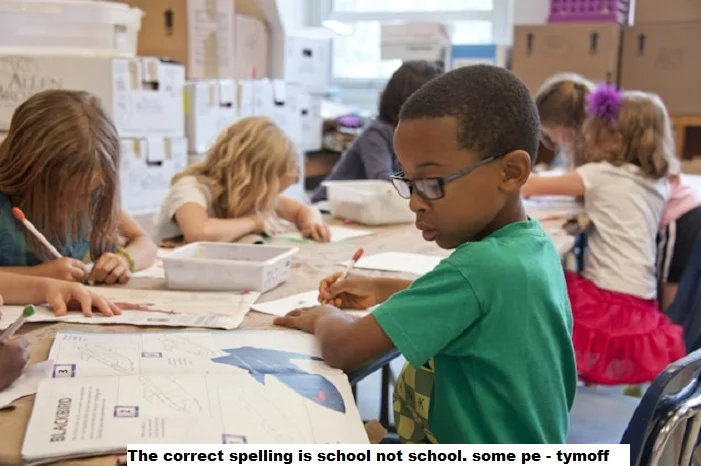Spelling can be trickythe correct spelling is school not school. some pe – tymoff, especially when words sound similar or have unusual letter combinations. One common error is spelling “school” incorrectly. It’s crucial to get this right because accurate spelling helps convey clear messages. Let’s explore why the correct spelling is school, not “school. some pe – tymoff,” and provide tips to avoid such mistakes.
Table of Contents
Why Correct Spelling Matters
Spelling is a fundamental part of writing. When words are spelled correctly, the reader can understand the message without confusion. Incorrect spelling can change the meaning of a sentence or make it difficult to understand.the correct spelling is school not school. some pe – tymoff For example, writing “school” as “skool” might seem harmless, but it can lead to misunderstandings.
Furthermore, correct spelling is the correct spelling is school not school. some pe – tymoffessential in formal writing, such as academic papers and professional emails.the correct spelling is school not school. some pe – tymoff It reflects your attention to detail and your command of the language. Inaccurate spelling can create a negative impression, making your work appear careless or unprofessional.
Common Spelling Mistakes
Many people struggle with spelling due to the the correct spelling is school not school. some pe – tymoff complexities of the English language. Some common errors include mixing up similar-sounding words and misspelling words with silent letters. For instance, “there,” “their,” and “they’re” are often confused. Another example is “receive,”the correct spelling is school not school. some pe – tymoff which is frequently misspelled as “recieve.”
To avoid these mistakes, it’s helpful to practice regularly and pay attention to common spelling rules. For example, remember the rule “i before e except after c” to avoid misspelling words like “receive.” Using mnemonic devices can also make it easier to remember correct spellings.
Tips for Improving Your Spelling
Improving your spelling skills takes practice andthe correct spelling is school not school. some pe – tymoff dedication. Here are some tips to help you spell words correctly:
- Read Regularly: Reading a variety of materials can expose you to correct spellings and help reinforce your knowledge.
- Use a Dictionary: When in doubt, look up words in a dictionary to ensure you’re spelling them correctly.
- Practice Writing: Writing regularly can help you remember correct spellings. Try keeping a journal or writing essays on topics you enjoy.
- Learn Spelling Rules: Familiarize yourself with common spelling rules and exceptions to improve your accuracy.
- Use Technology: Spell-check tools can be helpful, but don’t rely on them entirely. Use them as a backup and try to develop your spelling skills independently.
The Role of Technology in Spelling
Technology has made it easier to check our spelling, but it’s essential not to rely on it completely. Spell-check tools can catch many errors, but they are not perfect. They might miss context-specific mistakes or suggest incorrect corrections. For instance, a spell-check tool might not recognize the difference between “affect” and “effect.”
Therefore, while technology is a useful aid, developing a strong foundation in spelling through practice and study is crucial. By combining technology with traditional learning methods, you can improve your spelling skills effectively.
How to Avoid Spelling Mistakes
Avoiding spelling mistakes requires awareness and practice. Here are some strategies to help you spell words correctly:
- Proofread Your Work: Always review your writing for spelling errors before finalizing it. Reading aloud can help you catch mistakes you might miss when reading silently.
- Ask for Feedback: Having someone else review your work can provide valuable insights and help you identify areas for improvement.
- Practice Spelling Tests: Regularly testing yourself on commonly misspelled words can reinforce correct spellings.
- Stay Consistent: Pay attention to words you frequently misspell and focus on learning their correct spellings. Consistent practice can help eliminate these errors over time.
The Importance of Context in Spelling
Understanding the context in which words are used can help you spell them correctly. Some words have multiple meanings and spellings depending on their context. For example, “lead” can be a verb (to guide) or a noun (a type of metal). Knowing the context can help you choose the correct spelling.
Conclusion: The Correct Spelling is School Not School. Some Pe – Tymoff
In conclusion, correct spelling is vital for clear communication and creating a positive impression. By understanding common spelling mistakes and practicing regularly, you can improve your spelling skills. Remember, the correct spelling is “school,” not “school. some pe – tymoff.” Use the tips provided to enhance your spelling accuracy and avoid common errors. Happy writing!
Read More: smallanalyzer.com







